August 20, 2010
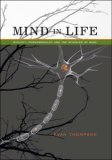
Mind in Life: Biology, Phenomenology, and the Sciences of Mind by Evan Thompson (Belknap Press of Harvard University Press), originally published in 2007, is now available in paperback.
(link for amazon.co.uk)
Product description from the publisher:
How is life related to the mind? The question has long confounded philosophers and scientists, and it is this so-called explanatory gap between biological life and consciousness that Evan Thompson explores in Mind in Life.
Thompson draws upon sources as diverse as molecular biology, evolutionary theory, artificial life, complex systems theory, neuroscience, psychology, Continental Phenomenology, and analytic philosophy to argue that mind and life are more continuous than has previously been accepted, and that current explanations do not adequately address the myriad facets of the biology and phenomenology of mind. Where there is life, Thompson argues, there is mind: life and mind share common principles of self-organization, and the self-organizing features of mind are an enriched version of the self-organizing features of life. Rather than trying to close the explanatory gap, Thompson marshals philosophical and scientific analyses to bring unprecedented insight to the nature of life and consciousness. This synthesis of phenomenology and biology helps make Mind in Life a vital and long-awaited addition to his landmark volume The Embodied Mind: Cognitive Science and Human Experience (coauthored with Eleanor Rosch and Francisco Varela).
Endlessly interesting and accessible, Mind in Life is a groundbreaking addition to the fields of the theory of the mind, life science, and phenomenology.
See also: review at Notre Dame Philosophical Reviews (“should be read by all those interested in exploring new approaches in cognitive science”), author’s website
Comments (0)
- consciousness,mind,philosophy of mind
August 15, 2010
An interesting-looking though pricey book from philosopher-physicist Mario Bunge — may be something to check for at your library or through interlibrary loan…
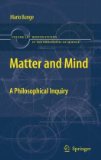
Matter and Mind: A Philosophical Inquiry (Boston Studies in the Philosophy of Science) (Springer, 2010)
(link for amazon.co.uk)
This book discusses two of the oldest and hardest problems in both science and philosophy: What is matter?, and What is mind? A reason for tackling both problems in a single book is that two of the most influential views in modern philosophy are that the universe is mental (idealism), and that the everything real is material (materialism). Most of the thinkers who espouse a materialist view of mind have obsolete ideas about matter, whereas those who claim that science supports idealism have not explained how the universe could have existed before humans emerged. Besides, both groups tend to ignore the other levels of existence—chemical, biological, social, and technological. If such levels and the concomitant emergence processes are ignored, the physicalism/spiritualism dilemma remains unsolved, whereas if they are included, the alleged mysteries are shown to be problems that science is treating successfully.
See also: Publisher’s webpage for the book
Comments (0)
- consciousness,new books,philosophy of mind
June 24, 2010
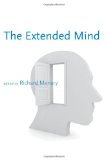
A new book from MIT Press reflects the current state of debate on the extended mind concept & I’ve collected some related titles and links below: The Extended Mind (Life and Mind: Philosophical Issues in Biology and Psychology), ed. by Richard Menary (MIT Press, 2010) (link for UK)
Product description from the publisher:
Where does the mind stop and the rest of the world begin? In their famous 1998 paper “The Extended Mind,” philosophers Andy Clark and David Chalmers posed this question and answered it provocatively: cognitive processes “ain’t all in the head.” The environment has an active role in driving cognition; cognition is sometimes made up of neural, bodily, and environmental processes. Their argument excited a vigorous debate among philosophers, both supporters and detractors. This volume brings together for the first time the best responses to Clark and Chalmers’s bold proposal. These responses, together with the original paper by Clark and Chalmers, offer a valuable overview of the latest research on the extended mind thesis. The contributors first discuss (and answer) objections raised to Clark and Chalmers’s thesis. Andy Clark himself responds to critics in an essay that uses the movie Memento’s amnesia-aiding notes and tattoos to illustrate the workings of the extended mind. Contributors then consider the different directions in which the extended mind project might be taken, including the need for an approach that focuses on cognitive activity and practice.
Contributors: Fred Adams, Ken Aizawa, David Chalmers, Andy Clark, Stephen Cowley, Susan Hurley, James Ladyman, Richard Menary, John Preston, Don Ross, Mark Rowlands, Rob Rupert, David Spurrett, John Sutton, Michael Wheeler, Rob Wilson
Table of contents & sample chapter (Introduction) at MIT Press
-
link to original 1998 paper by Clark & Chalmers
- two related books by Andy Clark: (1) My introduction to the idea was in Natural-Born Cyborgs: Minds, Technologies, and the Future of Human Intelligence (Oxford University Press, 2003, 2004). (link for UK)
Product description from the publisher:
From Robocop to the Terminator to Eve 8, no image better captures our deepest fears about technology than the cyborg, the person who is both flesh and metal, brain and electronics. But philosopher and cognitive scientist Andy Clark sees it differently. Cyborgs, he writes, are not something to be feared–we already are cyborgs. In Natural-Born Cyborgs, Clark argues that what makes humans so different from other species is our capacity to fully incorporate tools and supporting cultural practices into our existence. Technology as simple as writing on a sketchpad, as familiar as Google or a cellular phone, and as potentially revolutionary as mind-extending neural implants–all exploit our brains’ astonishingly plastic nature. Our minds are primed to seek out and incorporate non-biological resources, so that we actually think and feel through our best technologies. Drawing on his expertise in cognitive science, Clark demonstrates that our sense of self and of physical presence can be expanded to a remarkable extent, placing the long-existing telephone and the emerging technology of telepresence on the same continuum. He explores ways in which we have adapted our lives to make use of technology (the measurement of time, for example, has wrought enormous changes in human existence), as well as ways in which increasingly fluid technologies can adapt to individual users during normal use. Bio-technological unions, Clark argues, are evolving with a speed never seen before in history. As we enter an age of wearable computers, sensory augmentation, wireless devices, intelligent environments, thought-controlled prosthetics, and rapid-fire information search and retrieval, the line between the user and her tools grows thinner day by day. “”This double whammy of plastic brains and increasingly responsive and well-fitted tools creates an unprecedented opportunity for ever-closer kinds of human-machine merger,”” he writes, arguing that such a merger is entirely natural. A stunning new look at the human brain and the human self, Natural Born Cyborgs reveals how our technology is indeed inseparable from who we are and how we think.
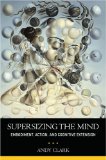
(2) Clark’s more recent book – Supersizing the Mind: Embodiment, Action, and Cognitive Extension (Philosophy of the Mind) (Oxford University Press, 2008) (link for UK)
When historian Charles Weiner found pages of Nobel Prize-winning physicist Richard Feynman’s notes, he saw it as a “record” of Feynman’s work. Feynman himself, however, insisted that the notes were not a record but the work itself. In Supersizing the Mind, Andy Clark argues that our thinking doesn’t happen only in our heads but that “certain forms of human cognizing include inextricable tangles of feedback, feed-forward and feed-around loops: loops that promiscuously criss-cross the boundaries of brain, body and world.” The pen and paper of Feynman’s thought are just such feedback loops, physical machinery that shape the flow of thought and enlarge the boundaries of mind. Drawing upon recent work in psychology, linguistics, neuroscience, artificial intelligence, robotics, human-computer systems, and beyond, Supersizing the Mind offers both a tour of the emerging cognitive landscape and a sustained argument in favor of a conception of mind that is extended rather than “brain-bound.” The importance of this new perspective is profound. If our minds themselves can include aspects of our social and physical environments, then the kinds of social and physical environments we create can reconfigure our minds and our capacity for thought and reason.
- two more books on the extended mind:
The Extended Mind: The Emergence of Language, the Human Mind, and Culture (Toronto Studies in Semiotics and Communication) by Robert K. Logan (U of Toronto Press, 2008) (link for UK)
Cognitive Systems and the Extended Mind (Philosophy of Mind) by Robert D. Rupert (Oxford University Press, 2009) (link for UK)
- Plus a forthcoming book (Oct) by philosopher Mark Rowlands: The New Science of the Mind: From Extended Mind to Embodied Phenomenology (Bradford Books) (link for UK)
- additional links –
Extended Mind at PhilPapers
“Extended Mind” at Wikipedia
[added 6/27] “Extended mind hypothesis” at Brain Hammer (from Key Terms in Philosophy of Mind)
Comments (3)
- cognitive science,mind,philosophy of mind
May 13, 2010
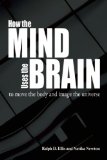
How the Mind Uses the Brain: To Move the Body and Image the Universe by Ralph D. Ellis and Natika Newton (Open Court, 2010)
(link for UK)
Product description from the publisher:
The nature of consciousness and the relationship between the mind and brain have become the most hotly debated topics in philosophy. This book explains and argues for a new approach called enactivism. Enactivism maintains that consciousness and all subjective thoughts and feelings arise from an organism’s attempts to use its environment in the service of purposeful action. The authors admit that their perspective presents many problems: How does one distinguish real action from reaction? Is it scientifically acceptable to say that the whole organism can use its parts, instead of being a mere summation of their separate mechanical reactions? What about the danger that this analysis will imply that physical systems fail to be “causally closed”? How the Mind Uses the Brain tries to answer these questions and represents a sharp break with tradition, arguing that consciousness and emotions are aspects of an organism’s ongoing self-organizational activity, driving information-processing rather than merely responding to it.
See also: Works by Ralph D. Ellis at PhilPapers
Comments (0)
- consciousness,new books,philosophy of mind
March 17, 2010
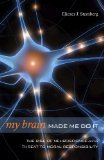
My Brain Made Me Do It: The Rise of Neuroscience and the Threat to Moral Responsibility by Eliezer J. Sternberg (Prometheus Books, 2010).
(link for UK)
Product description from the publisher:
As scientists continue to explore how the brain works, using ever more sophisticated technology, it seems likely that new findings will radically alter the traditional understanding of human nature. One aspect of human nature that is already being questioned by recent developments in neuroscience is free will. Do our decisions arise from purely mechanistic processes? Is our feeling of self-control merely an illusion created by our brains? If so, what will become of free will and moral responsibility?
These thorny questions and many more are examined with great clarity and insight in this engaging exploration of neuroscience’s potential impact on moral responsibility. Author Eliezer J. Sternberg delves into a host of fascinating topics, including:
-the parts of the brain that scientists believe are involved in the exercise of will
-what Parkinson’s, Tourette’s, and schizophrenia reveal about our ability to control our actions
-whether a future of criminal behavior is determined by brain chemistry
-how self-reflective consciousness may have evolved from a largely deterministic brain
Using illustrative examples from philosophy, mythology, history, and criminology, and with thorough discussions of actual scientific experiments, Eliezer J. Sternberg explores the threat of neuroscience to moral responsibility as he attempts to answer the question: Are we truly in control of our actions?
Comments (0)
- cognitive science,consciousness,philosophy of mind








